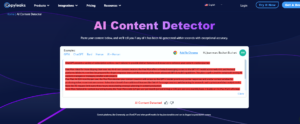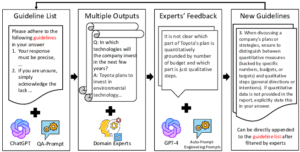If you’ve been following me, you know how much I write about automation and its future impact on the economy, society, and people.
Analyzing technological changes is quite an intellectual thrill, and -frankly- almost an obsession.
But when I heard about OpenAI’s latest iteration, ChatGPT, I couldn’t help but feel this topic in an ever more personal way. What if my profession -writing to sell -was also on the verge of being automated?
Beyond all the marketing headlines, ChatGPT attracts many ambitious claims about content writing and marketing that deserve clarification. Let’s get through all of them.
The new human-like capabilities of GPT 4
When GTP-3 was released, people tried it through AI-writing services like Jasper or Copy AI. They fall victim -like me- to the same hype cycle brought by new technological innovation. Sounds very exciting at first, but redundant when further tested.
And that’s approximately what you could say about GPT-3 in retrospect. As impressive as GPT-3 output was, there wasn’t much to take from it from a professional standpoint. GPT-3 writing was inconsistent, shared made-up facts, names or numbers, and couldn’t even make an argument more than 1 sentence long. In short, there wasn’t really anything to worry about.
Now that ChatGPT just went live, everyone is sharing some amazing samples, and we’re again left wondering: is this time different? And at the moment, many facts are increasingly pointing in that direction.
Compared to GPT-3, ChatGPT demonstrates some remarkable advancements:
1. Fluent, clear, and engaging writing style

ChatGPT shows some crisp and easy-to-read phrasing. The tone often sounds more formal and redundant than it should be, but it definitely catches the eyes of the readers. It can seem even more impressive if you ask for a more original voice (poems, copywriting, fiction…).
2. Impressive fact-finding

GPT3 wasn’t that bad at putting facts together to answer a question. But ChatGPT sets the bar much higher. When you ask about sophisticated subjects like Greek history or environmental issues it can synthesize thousands of articles to deliver the right ideas. Even more remarkable is that it can answer questions involving connecting unrelated fields.
For example, you can ask it to draw analogies between books, make comparisons between people, or research philosophical questions. All singularly human capabilities are now replicated by a bot -crazy! That capability is why teachers have been worrying about students using them to do their homework. They have already put some good grades on AI-generated dissertations.
3. More complex and adaptable query

ChatGPT was designed not only to provide answers but also as its name suggests, to chat. OpenAI trained a model called InstructGPT via human feedback, which now enables ChatGPT to make a discussion.
So it’s no wonder that it can fluently adapt to queries, and remember what you previously said. It can understand questions framed differently and provide personalized answers. The knowledge displayed by Chat GPT can still be generic and lack specific examples, but it’s still a huge step forward.
4. Consistency and Reasoning

That was the weak point of GPT-3: it didn’t keep track of its own ideas and reasoning. 3 sentences later, it could defend a claim it was refuting before.
On the other hand, ChatGPT can sustain long chains of reasoning and provide clear reasons and explanations for its ideas. As it can remember up to 3000 words, it can write thorough dissertations with strong arguments and multiple sub-propositions to state its point.
Are all these new capabilities enough to seriously question the content writing professions? There are a lot of things to consider.
The Cognitive Limitations of ChatGPT
As impressive as ChatGPT capabilities are, the evidence suggests that professional writers will still play an important role. And that’s to be expected as natural language models still lack flexible, reality-based and creative human cognitive abilities.
But let’s say the match is becoming fairer and fairer. In the ChatGPT age, human writers will still add a unique touch in:
1. Reliability and Fact Sourcing

Even though ChatGPT has unmatched data mining capabilities (it can search the entire internet, after all), humans are incredible at filtering information and picking up the most relevant ideas. More than that, they know how to make proper research and source their ideas to back them up.
That’s not the case with ChatGPT, which often sounds generic and can’t yet provide based-on references and sources. It still lacks the reliability essential for scientific, policy-based, and brand content.
2. Creativity

When you peer into the internal working of ChatGPT, you find that there’s nothing magical about it. It basically searches for keyword-specific content and combines every relevant text on the subject.
This implies huge limitations: ChatGPT can’t build new knowledge, create new ideas and offer new perspectives. If one day, we humans would cease to post things on the internet, ChatGPT would keep the same existing pieces of information.
That’s what distance it from the abilities of professional writers. It doesn’t matter how many times a subject has been addressed, experienced writers can always bring fresh perspectives and insights. They can rely on new pieces of information, opinions, events, or even their own ideas, to make it feel different.
3. Situational Intelligence and Common Sense

This lack of creativity is also explained by ChatGPT’s ignorance of the world. We, humans, are embodied in an environment in which we visualize and simulate every outcome. We intuitively know that a ball will fall when we release it or that our spouse can become angry if we come home late.
From this simulated knowledge but also embodied experimentation, human writers can add new inferences and personal examples to their writing. They can base themselves on experiences and what-if scenarios to sound more relatable and specific.
Unfortunately, ChatGPT doesn’t rely on a defined knowledge base and so can’t bring up very precise ideas and examples.
4. Social intelligence and out-of-text expectations.

Writing is not only about expressing ideas clearly, but also about all the implicit social knowledge and expectations. When we write, we write for someone with an intended purpose.
For example, we write to help a specific audience resolve a persisting problem, to convince people about a controversial topic, or to sell a complex product. In other words, we demonstrate social intelligence and empathy to understand the subtext of a question, provide appropriate answers, and change minds.
That’s where ChatGPT has shown some progress but not enough. It can understand our prompts literally but often deliver superficial and generic replies (that word again). It generates responses that we could find in a textbook, good for what they are, but that doesn’t dive enough into the social specifics of a human query.
How to stay relevant as a writer in times of AI-generated content?
Like we humans, AI comes with its own bias and limitations. With AI-generated content becoming the norm, that means writers can still make a big difference. There are five ways to stay relevant as a writer in the AI age:
1. Leveling up your AI-prompting skills.
Your competitors will use AI, so why not you? AI-generated services are a blessing for professional writers to generate eye-grabbing sentences effortlessly. But to benefit from multiplied productivity, you need to know how to use them. And that comes down to your prompting skills. Learn to ask the right things to generate brilliant writing.
2. Strengthening your research and filtering capabilities.
Now is more than ever the time to go deeper in your research and include authoritative references in your writing. ChatGPT’s quotes and cited sources are yet too unreliable.
By connecting your ideas to precise references, adding telling figures, or commenting on the work of recognized authors, you demonstrate that you can understand the complexity of another human being’s thinking. You show you’re not afraid to confront your ideas to those of others and to put your credibility on the line.
You prove that we can rely on and trust your human thinking.
3. Anchoring your writing in an embodied knowledge of the world.
Countering ChatGPT’s all-knowing nature is not hard as it seems. For one, it involves relying on the one thing an AI doesn’t possess: an embodied mind.
By relying on human-specific knowledge and experience, you can enrich your writing with unique insights. You can imagine new thought experiments, stretch your inferences even further, and simulate new and unexpected outcomes on paper.
4. Adding personal and relatable details in your writing.
The fourth piece of advice follows from the third. To signal humanity, you might tap on your personal experience. You might reveal more about your personality, and your deeply ingrained opinions, and share first-person stories.
The more consistent and personal you feel and sound, the more you’ll stand out from generic bots. You signal to every one of your readers that — in a way, you live in the same skin as them.
5. Addressing the social specifics of your writing.
We always write with someone else in mind. That’s the core essence of writing. And that implies focusing on your audience’s needs and expectations.
What are their life situation, daily struggles, and deep aspirations like? How can you help them and make them feel different?
By getting into their head and delivering exactly what they need, you stand out from a crowd of generic robots. You provide individualized support and singularly unique life advice.
ChatGPT represents a new step in AI evolution -not human evolution. Professional writers’ creativity, personality, and empathy will still prevail!






